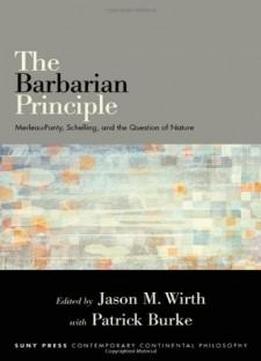
The Barbarian Principle: Merleau-ponty, Schelling, And The Question Of Nature (suny Series In Contemporary Continental Philosophy)
by Jason M. Wirth /
2013 / English / PDF
1.8 MB Download
Essays exploring a rich intersection between phenomenology and
idealism with contemporary relevance.
Essays exploring a rich intersection between phenomenology and
idealism with contemporary relevance.
Toward the end of his life, Maurice Merleau-Ponty made a striking
retrieval of F. W. J. Schelling’s philosophy of nature.
Toward the end of his life, Maurice Merleau-Ponty made a striking
retrieval of F. W. J. Schelling’s philosophy of nature.The
Barbarian Principle
The
Barbarian Principle explores the relationship between these two
thinkers on this topic, opening up a dialogue with contemporary
philosophical and ecological significance that will be of special
interest to philosophers working in phenomenology and German
idealism.
explores the relationship between these two
thinkers on this topic, opening up a dialogue with contemporary
philosophical and ecological significance that will be of special
interest to philosophers working in phenomenology and German
idealism.
“
“The Barbarian Principle
The Barbarian Principle is an excellent contribution to the
study of Schelling and Merleau-Ponty. For the Schelling scholar or
student, it opens a new horizon for reconsidering Schelling’s
influence on twentieth-century continental philosophy in general,
and phenomenology in particular (where much interest has been paid
to Heidegger). For the Merleau-Ponty scholar or student, this
volume demonstrates that Merleau-Ponty’s engagement with German
idealism extends well beyond the interrogation of Hegel or Kant.” —
Devin Zane Shaw, author of
is an excellent contribution to the
study of Schelling and Merleau-Ponty. For the Schelling scholar or
student, it opens a new horizon for reconsidering Schelling’s
influence on twentieth-century continental philosophy in general,
and phenomenology in particular (where much interest has been paid
to Heidegger). For the Merleau-Ponty scholar or student, this
volume demonstrates that Merleau-Ponty’s engagement with German
idealism extends well beyond the interrogation of Hegel or Kant.” —
Devin Zane Shaw, author ofFreedom and Nature in Schelling’s
Philosophy of Art
Freedom and Nature in Schelling’s
Philosophy of Art











